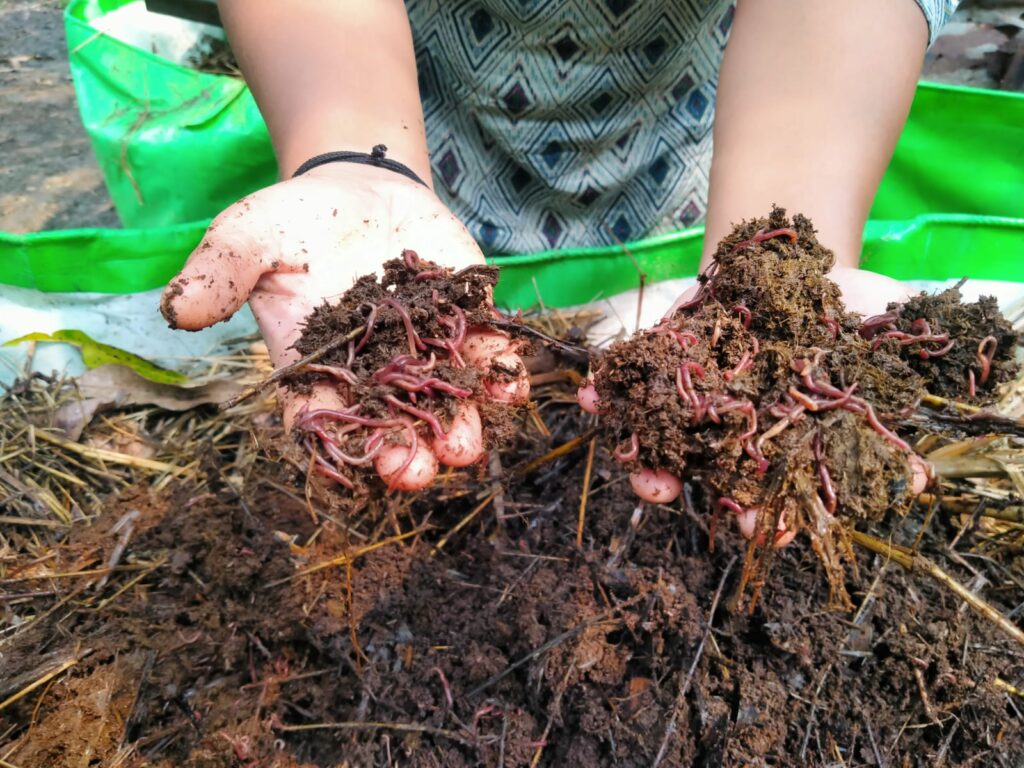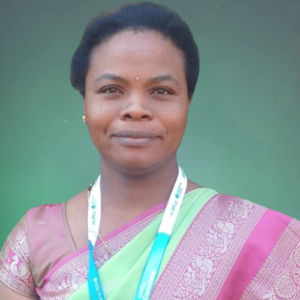Case Study: Demakka’s Roti Revolution!

A homemaker with a passion for baking and sharing rotis embarked on an inspiring journey with CherYsh, which transformed her life and her kitchen. Let us delve into her remarkable story. Demakka, a devoted homemaker and mother of three, changed her life through entrepreneurship with the support of CherYsh and Roviralta, an organization dedicated to uplifting people’s lives. This case study showcases Demakka’s journey from a small-scale roti seller to a thriving businesswoman, with CherYsh, the Selco Foundation, and the Roviralta Foundation playing a crucial role in her success. Before starting her entrepreneurial venture, Demakka sold rotis to her neighbours to help support her family. A few years ago, CherYsh, in partnership with the Roviralta Foundation, built Community Kitchens in Haliyal. The goal was to teach village women about food hygiene, reduce the use of wood and coal for cooking, and help them develop skills in commercial food production. Partners like Taj Gateway and Akshaya Patra provided training in Hubli, and these kitchens became the foundation for entrepreneurial food product ideas. CherYsh recognized Demakka’s potential and, in collaboration with the Selco Foundation, provided her with a solar-powered roti-making machine and essential training. Eager to build her own business, Demakka seized the opportunity. With CherYsh’s guidance, she learned how to efficiently operate the solar-powered machine. This not only boosted her production but also reduced her reliance on conventional energy sources something that Cherysh and Roviralta aimed for since 2013. When the challenges of COVID-19 arose, Demakka didn’t give up. Instead, she and her family used this adversity as an opportunity for growth. Today, she is producing rotis not only for her neighbourhood but also for nearby towns and villages. Despite the challenges of the pandemic, Demakka’s resilience, along with the sustainability of her business model, helped her overcome obstacles. Her family joined her in the venture, contributing to its growth. A standout feature of Demakka’s success story is the solar-powered roti-making machine. This reflects both environmental consciousness and innovative solutions from CherYsh that empower individuals through livelihood programs. Demakka’s approach is also noteworthy; she never turns away a customer, even if they only need a few rotis. For her, it’s not just about making money, but about feeding people. Her commitment to providing food, no matter the order size, underscores the ethical foundation of her business. She values customer well-being over profit, highlighting the importance of ethics in entrepreneurship. But Demakka’s ambitions don’t stop here. She dreams of expanding her business even further, hoping to acquire flour mill equipment; not just for her family, but to benefit her entire community. With some training and a great deal of enthusiasm, Demakka transitioned from a home cook to a roti-making star. Her journey from homemaker to successful entrepreneur is a powerful testament to the transformative impact of livelihood programs. Demakka’s story is not just about rotis; it’s about turning everyday things into something extraordinary. Thanks to CherYsh and a solar-powered machine, her kitchen became a business hub, and Demakka proves that with the right support, anyone can make a big difference. CherYsh’s strategic collaboration with Roviralta, the Selco Foundation and emphasis on sustainable business practices have not only empowered Demakka but have also set an inspiring example for women entrepreneurs. Demakka’s story serves as a beacon of hope, illustrating the potential within every individual when given the right opportunities and support. Let’s celebrate Demakka’s Roti Revolution and the incredible possibilities that emerge when we work together to make a difference!
Case Study: Savitri’s Sugarcane Nursery in Mundwad

Savitri, from Mundwad, has cultivated more than just a nursery in her village – she has nurtured resilience and success. Her journey from starting a sugarcane bud nursery to thriving in a male-dominated industry is a testament to her determination and the support she received. Savitri’s venture began with training at the Murugappa Group in Chennai, supported by CherYsh, where she learned the ropes of establishing a sugarcane bud nursery. She excitedly walked us through the entire process – from cutting sugarcane buds using a machine to utilizing cocopeat for germination and packing the seedlings. A remarkable detail is how she cleverly returns any waste from the cutting process to the sugarcane factory, ensuring minimal waste. Savitri proudly shared that she sold approximately 8 lakh seeds last year – a truly impressive accomplishment. However, her journey has not been without hurdles. Initially, CherYsh trained three women from her village to help start the nursery. Unfortunately, they faced challenges with germination, and her partners eventually decided to abandon the project. Undeterred, Savitri pressed on, and her unwavering determination eventually paid off. Today, she not only turns a profit but also provides seasonal employment for around 10 people in her nursery. Savitri recalled the scepticism and mockery she faced from others who doubted that women could succeed in such an industry. Her response was simple yet powerful: “People were making fun of us saying women cannot succeed in these kinds of things, which made me want to prove them wrong.” Over the course of six years, Savitri has built a thriving nursery and developed strong relationships with farmers, creating a loyal customer base. Early on, she faced financial challenges, particularly in sourcing water for her operations. But her perseverance led her to own a borewell, solving the water issue and allowing her business to flourish. Innovations for Sustainability: Savitri’s commitment to sustainability shines through in her initiatives. She created a vermicompost space to efficiently use waste cocopeat and seed wastage, demonstrating her dedication to minimizing her environmental impact. Life Lessons and Support: Savitri shared her life philosophy, emphasizing the importance of navigating both sadness and happiness with grace. She spoke about facing challenges head-on and forging one’s own path. Savitri also highlighted the invaluable support from her husband, recognizing how essential a strong support system is in overcoming obstacles. Savitri’s story is a powerful example of resilience and determination. Her journey shows how community support and perseverance can turn challenges into triumphs. Her sugarcane bud nursery not only contributes to the local economy but also stands as a symbol of empowerment, breaking gender stereotypes in the agricultural landscape.
Case Study: Shehnaz’s Knitting Revolution in Mundwad

Meet Shehnaz, the driving force behind a knitting revolution in Mundwad. What began as a personal hobby has blossomed into a community empowerment initiative, transforming the lives of women in her village through skill, determination, and shared success. Shehnaz, originally from Agra Cantt, lived with her ex-army husband during his service, where she developed her skills in nail knitting. When her husband retired and they returned to Mundwad, what started as a domestic activity soon became something much bigger. Recognizing Shehnaz’s talent, CherYsh saw an opportunity to turn her knitting passion into a thriving business. With CherYsh’s support, Shehnaz began sharing her craft with around 50+ women in the village. This initiative gave each participant artisan cards, which not only identified them as artisans but also enabled them to participate in exhibitions across cities like Kolkata, Bangalore, Nagpur, and Pune. The exposure helped the women broaden their horizons and gain recognition for their work. Shehnaz highlights the economic impact this initiative has had on the women in her community. By earning additional income from their knitting, these women have gained financial independence, all while balancing their regular activities. Their travels to various cities exposed them to new experiences, from visiting beaches to navigating sleeper buses and trains—experiences that have taken them far beyond their previous village life. Driven by a desire to uplift other women in her village, Shehnaz finds joy in seeing them become financially independent and empowered. For her, this work is not just about knitting—it’s about transforming lives and creating opportunities for others. CherYsh’s collaboration with V-Act NGO expanded market linkages for Shehnaz and her team, bringing more opportunities their way. Additionally, Shehnaz received advanced training from NIFT Bangalore, and in turn, she trained around 70 NIFT students in nail knitting, enhancing both her expertise and that of others. Shehnaz recognizes the challenge of convincing women to step out of their comfort zones and turn their skills into profitable ventures. She firmly believes that government jobs alone cannot provide for everyone and encourages others to seize opportunities, such as the Artisan cards, to create sustainable livelihoods. Now, Shehnaz has her sights set on an exhibition in Delhi, eager to explore new designs in nail knitting and further expand her business. Her story is a powerful testament to the transformative potential of skills, community collaboration, and the ripple effect of empowerment. From Agra Cantt to Mundwad, Shehnaz’s journey is a shining example of how CherYsh’s creating opportunities and fostering creativity can shape a brighter future for women in the community.
Case Study: Cultivating Sustainability: Fakkirappa Vermicompost Story

Fakkirappa, a dedicated farmer with a passion for innovation, began his vermicomposting journey eight years ago. Unfortunately, his initial attempt faltered due to a lack of proper guidance and water resources, leaving him with unsatisfactory results. However, his fortunes changed when CherYsh, recognizing his proactive attitude, reached out and introduced the idea of revitalizing his vermicomposting efforts. This partnership not only transformed Fakkirappa’s approach to farming but also became a shining example of sustainable agricultural practices in his community. CherYsh, committed to sustainable development, extended its support to Fakkirappa and five other like-minded farmers. We provided comprehensive training sessions in the Karwar region, equipping them with the knowledge and skills needed to succeed in vermicomposting. Furthermore, CherYsh supplied essential materials such as composting bags and worms—key elements for creating a thriving vermicomposting system. Just three months into the project, Fakkirappa and his fellow farmers made impressive progress. The compost was ready, marking a significant milestone in their journey toward sustainable farming. CherYsh has been instrumental in ensuring the quality of the compost, even conducting tests to verify its effectiveness. Fakkirappa’s dedication to sustainable farming extends beyond composting. With CherYsh’s support, he is constructing a permanent shed specifically for vermicomposting. This infrastructure will not only ensure a reliable and consistent supply of compost but also reflects Fakkirappa’s long-term vision for sustainable agriculture. The Importance of VermicompostVermicompost plays a vital role in sustainable farming. Enriched with nutrients from earthworms, it acts as a potent organic fertilizer, enhancing soil fertility without the harmful effects of chemical fertilizers. It boosts microbial activity in the soil, improving structure, water retention, and nutrient absorption by plants, leading to healthier crops and a more sustainable farming model. Sustainable Measures and Economic ImpactFakkirappa’s embrace of sustainable farming practices, particularly vermicomposting, is not only contributing to environmental preservation but also improving his financial well-being. By reducing reliance on chemical fertilizers, he lowers input costs, making farming more economically viable. Furthermore, by selling surplus compost to local farmers, he generates additional income, highlighting the dual benefits of sustainability and financial stability. Fakkirappa’s ImpactFakkirappa’s transformation from a failed vermicomposting attempt to a thriving example of sustainable farming is a powerful testament to the impact of guidance and collaboration. With CherYsh’s support, coupled with Fakkirappa’s determination, his efforts have revitalized vermicomposting and become a catalyst for sustainable agriculture in his community. As he continues to build his vermicomposting infrastructure, Fakkirappa’s story stands as an inspiring example of how one farmer’s commitment to sustainable practices can positively influence the environment, community, and his own livelihood.
Case Study : Empowering Threads: Tattigere Quilting Collective

In the charming village of Tattigere, a group of women has transformed the traditional craft of quilting into a thriving business. Led by Ashabi and supported by the CherYsh organization, these women have not only created beautiful handwoven quilts but have woven a powerful story of empowerment, collaboration, and community transformation. Ashabi, a talented quilter, inherited her skills from her mother and grandmother, preserving the rich quilting tradition that has been passed down through generations in Tattigere. Building on this heritage, Ashabi and other women in the village, all skilled in the craft, came together to turn their shared passion into a sustainable business venture. CherYsh has been a key ally in the success of the Tattigere Quilting Collective. Recognizing the potential of the women’s craftsmanship, CherYsh has provided valuable resources, training, and a platform to help these women take their quilts to a larger market. This support has not only boosted the community’s economy but also empowered the women to use their skills to achieve financial independence and contribute to the broader community. The quilts produced by the Tattigere collective are more than just functional items; they are pieces of art. Each handwoven quilt adds a burst of color and warmth to a home, carrying with it the story of tradition, skill, and the collaborative spirit of the women who created it. These quilts bring beauty and meaning into living spaces, making them cherished possessions. Within the collective, the women have embraced their unique strengths. Ashabi notes that some members are excellent communicators, and these women are tasked with representing the group at exhibitions and markets. This strategic division of labour allows the creative artisans to focus on their craft, while others handle the business side of the venture, helping the collective reach a broader audience. When asked about the future of their quilting business, Ashabi expresses a desire for their work to be recognized beyond Karnataka. Her dream is for Tattigere quilts to become a celebrated art form across India, showcasing the talent and dedication of the women in her village. Quilting Impact The Tattigere Quilting Collective stands as a shining example of how community collaboration and entrepreneurship can transform lives. With the support of CherYsh, these women have not only revitalized a traditional craft but have also created a business that brings economic empowerment to their village and allows for children to remain in school. Each quilt is a testament to their resilience, creativity, and the enduring spirit of women working together to build a brighter, more colourful future. As Ashabi and her fellow artisans aim to take their quilts to every corner of the country, the Tattigere Quilting Collective represents a powerful story of empowerment, heritage preservation, and dreams that know no bounds.








